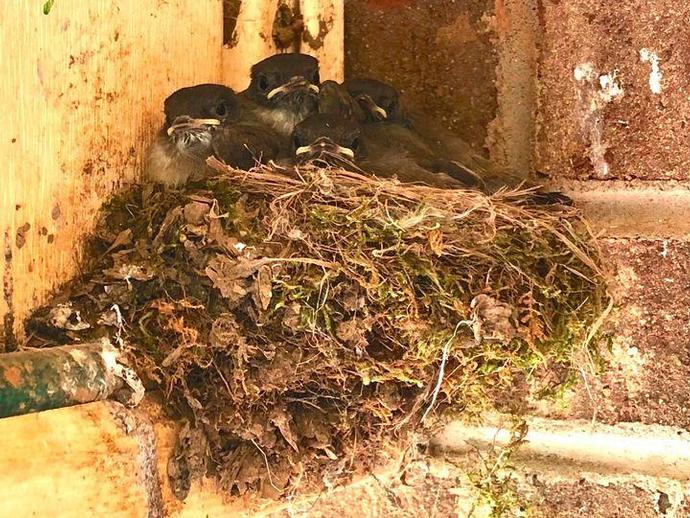August 1, 2021
We're reaching into the archives for today's #BenInNature update presented by our friends at Carter Bank & Trust! The following post was originally published on July 18, 2020.
Please enjoy this nest of fledgling eastern phoebes (Sayornis phoebe) as they stare at my camera in confusion!
Phoebe nests are fairly distinctive, as they have a mud base and are lined with moss and grass. They're usually built in crevices, whether on a rock or on a man-made structure (like my grandma's front porch).
Phoebes are migratory birds, spending the winters in the southern U.S. and even down to Central America! They're one of the first birds to return to their breeding grounds in the spring and one of the last to leave in the fall. During their breeding season, they can be found throughout the eastern and midwestern U.S. and up through much of western Canada.
These insect-eating birds are members of the family Tyrannidae, also known as the "tyrant flycatchers," which is a pretty metal name for a family of cute little birds. Tyrannidae is considered the largest family of birds and contains more than 400 species spread throughout North, Central, and South America.
If you'd like to see a phoebe, now is a great time to be on the lookout. They're fairly common and can be spotted in yards, parks, and the edges of forests.
ABOUT #BenInNature
Social distancing can be difficult, but it presents a great opportunity to become reacquainted with nature. In this series of posts, Administrator of Science Ben Williams ventures outdoors to record a snapshot of the unique sights that can be found in the natural world. New updates are posted Monday - Friday, with previous posts highlighted on the weekends. This series of posts is made possible thanks to the support of VMNH Corporate Partner Carter Bank & Trust (www.cbtcares.com).
NATURE PHOTO IDENTIFICATIONS
If you discover something in nature that you would like help identifying, be sure to message us right here on Facebook with a picture (please include location and date of picture) and we'll have our experts help you identify it!

 Hours & Admissions
Hours & Admissions Directions
Directions

